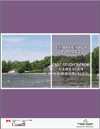Ontario
The Ontario case studies listed here were created or supported by CCIAD.
Each case study listing provides icons for quick topic reference, location, title, link and summary. A legend is also provided on the right.
Climate Change Adaptation in the City of Greater Sudbury
(2011) (PDF, 1.14 MB, 4 pages).
The City of Greater Sudbury has undertaken numerous adaptation initiatives over the past decade, including participating in assessments to identify vulnerabilities to climate change and the creation of the Sudbury Climate Change Consortium.


Sudbury
Hamilton Conservation Authority Climate Change Strategy
(2008) (PDF, 858 KB, 4 pages).
The creation of a Community Climate Change Action Charter by the City of Hamilton led to the development of the Hamilton Conservation Authority’s Climate Change Strategy. The strategy takes a watershed-based approach to adaptation and mitigation.


Hamilton
Federal Government Buildings in a Changing Climate


Ottawa
Climate Change and Toronto Culverts
(2011) (PDF).
Three road culverts were evaluated, using the PIEVC infrastructure risk assessment protocol, towards adaptive management for all culverts.


Toronto
Risks to Welland's Water Infrastructure from Climate Change
(2012) (PDF).
Storm water and wastewater system components at risk of failure, damage, or deterioration were identified using the PIEVC infrastructure risk assessment protocol.



Welland
Climate Change and Toronto Community Housing
(2012) (PDF).
Vulnerability of a public, residential high-rise building was assessed using the PIEVC infrastructure risk assessment protocol, and climatic projections for the years 2020 and 2050.


Toronto
Toronto Green Standard
(2012) (PDF, 17MB, 5 pages).
A set of performance measures to support the evaluation of site and building designs related to, energy and water efficiency, air and water quality, ecological services, and solid waste management.



Toronto
Hot Weather Response Plan
(2012) (PDF, 17MB, 4 pages).
Plan to alert those most at risk of heat-related illness that hot weather conditions either currently exist or are imminent, and to take appropriate precautions.


Sudbury
Forest Floor Mat Transplanting in Sudbury
(2012) (PDFs, 359KB, 4 pages).
A large-scale forest floor transplant program was developed by partnering with mining companies to develop a Biodiversity Action Plan.



Sudbury
York Region De-Icing Strategies
(2012) (PDF, 359KB, 4 pages).
The York Transportation and Community Planning Department Salt Management Plan introduced new tools and strategies for de-icing.



York Region
Guelph Water Conservation Programming
(2012) (PDF, 282KB, 4 pages).
A water conservation and efficiency strategy update that recommends a proactive suite of projects towards achieving a 20% reduction of average daily water consumption by 2025.



Guelph
Syndromic Surveillance System for Heat-Related Illnesses
(2012) (PDF, 530KB, 4 pages).
Results of a pilot project in Southeastern Ontario where an existing syndromic surveillance system has been adapted to monitor real-time environmental heat and heat-related illnesses


Hastings & Prince Edward Counties; Leeds, Grenville & Lanark District; Peterborough County-City; Kingston Frontenac and Lennox Addington (KFL&A)
Pioneer Park Stormwater Management Rehabilitation
(2012) (PDF, 450KB, 4 pages).
As part of Richmond Hill’s stormwater management system, the Pioneer Park Facility provides flood, water quality and erosion protection for approximately 740ha of land.



Richmond Hill
Alternative Land Use Services
(2012) (PDF, 339KB, 4 pages).
A pilot program in Norfolk County to maximize environmental benefit while engaging farm partners.



Norfolk County
Markham Greenprint Sustainability Plan
(2011) (PDF, 680KB, 4 pages).
Maintaining environmental health and establishing adaptive actions to manage future climate related risk.






Markham
Thunder Bay Cogeneration
(2012) (PDF, 392 KB, 4 pages).
Investments in a new waste water treatment facility reduced pollution and contributed to both climate change mitigation and adaptation efforts.


Thunder Bay
Peterborough Flood Reduction Programming
(2012) (PDF, 237 KB, 4 pages).
The City initiated the Flood Reduction Master Plan process to enhance resilience to future flooding.


Peterborough
First National Engineering Vulnerability Assessment Report
(2008) (PDF).
Vulnerability and adaptability of road-related infrastructure to climate change was assessed using the PIEVC infrastructure risk assessment protocol.



Sudbury
Vulnerability of Claireville and G. Ross Water Control Dams
(2010) (PDF).
An assessment of the vulnerabilities of the dams to a changing climate, using 2050 scenarios, was undertaken, following the PIEVC infrastructure risk assessment protocol.



Claireville and Toronto
Vulnerability of Sanitary Sewer System – Town of Prescott
(2012) (PDF).
Areas and operations of the Town's sanitary sewage system that may be at increased risk of failure and/or damage due to potential change in climate were identified with the PIEVC infrastructure risk assessment protocol.



Prescott
Page details
- Date modified:


















